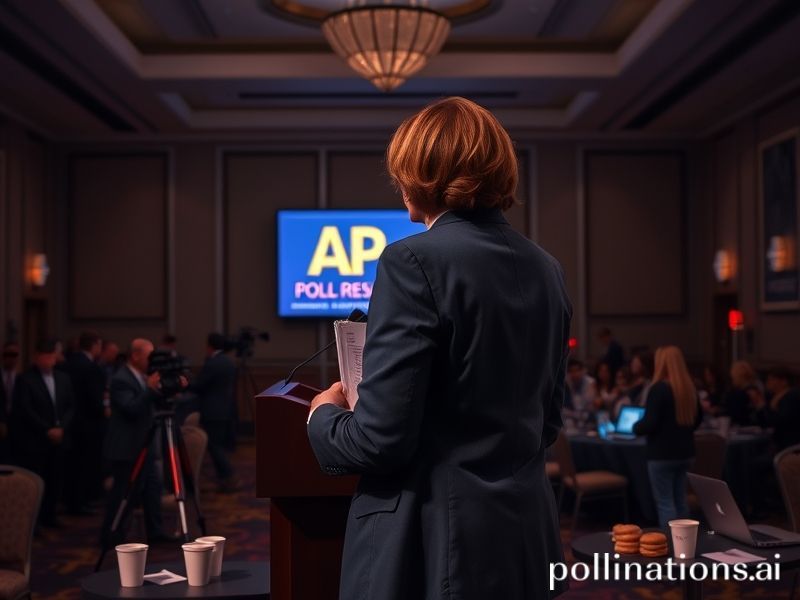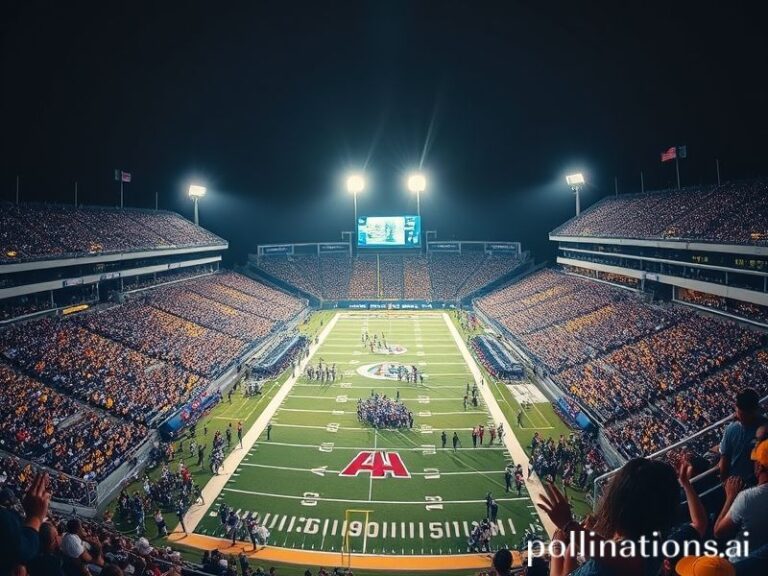AP Poll: How 62 Americans Secretly Rule the World’s Mood Every Monday
The AP Poll Is the World’s Most Tolerated Lie—And Everyone Keeps Pretending Otherwise
By “Globetrotting” G. M. Lefèvre, Senior Cynic-at-Large, Dave’s Locker
PARIS, FRANCE—Every Monday at 2 p.m. Eastern Standard Time (7 p.m. GMT, 3 a.m. Tuesday in Pyongyang for the truly committed), a cabal of 62 American sportswriters and broadcasters releases a ranking that dictates the emotional barometer of 330 million people and, curiously enough, the foreign-exchange students trying to make small talk at keg parties from Munich to Melbourne. The Associated Press college-football poll—once just a quaint wire-service gimmick to sell newspapers in 1936—has metastasized into the planet’s most politely accepted piece of performative numerology. Call it geopolitics with shoulder pads.
Outside the United States, the AP Poll is treated like the metric system in reverse: Americans swear by it, the rest of us pretend to understand it, and nobody really converts the decimals without rolling their eyes. In Singapore hawker centers, elderly men who can’t name a single Big Ten mascot will still wager on whether Michigan’s “style points” survive a noon kickoff against directional-Michigan-TECH. In Lagos traffic jams, podcast hosts dissect Alabama’s secondary as if discussing OPEC quotas. The poll’s gravitational pull is so strong that even nations without a single functioning goalpost now schedule diplomatic receptions around the release—partly for the hors d’oeuvres, mostly to see which ambassador’s alma mater just got humiliated at No. 25.
Why does a glorified opinion survey wield such planetary soft power? Simple: humans adore tidy hierarchies, especially when the underlying data is as reliable as a Moscow weather forecast. The poll offers the illusion of order in a world where actual borders shift overnight and crypto-billionaires evaporate by brunch. It’s the same psychological comfort that once made the British Empire color-code entire continents on classroom maps—only now the empire is ESPN, and the colonies refresh Twitter.
The global implications are darker than a November night in Fargo. Foreign betting syndicates—many headquartered in jurisdictions where “regulation” is just a line item on the bribe invoice—now hedge futures on whether a 19-year-old backup kicker from Iowa can keep the Hawkeyes inside the Top 10. Entire Caribbean economies wobble when Notre Dame’s ranking fluctuates; their sovereign-wealth funds long ago diversified away from sugar and into prop bets on Coastal Carolina’s red-zone efficiency. Meanwhile, the European Union—fresh out of real crises, apparently—debates whether to classify American college football as a cultural export deserving WTO protections, right next to bourbon and Marvel movies.
Back in Washington, the State Department monitors the poll with the same furrowed brows once reserved for troop movements. A precipitous drop for Ohio State can spark diplomatic migraines: the alumni network includes three current senators, two Supreme Court clerks, and the deputy director of the CIA’s drone-emoji division. When Texas tumbles, the peso hiccups; when USC sneaks into the Top 4, Beijing quietly doubles semiconductor tariffs out of pure spite. We are, it seems, one controversial overtime away from NATO Article 5 being invoked because someone in Ames, Iowa, ran a fake field goal.
And yet, for all its international ripple effects, the poll remains charmingly provincial—like a Rotary Club bake sale that somehow influences LIBOR. The voters themselves still fax in ballots, presumably while listening to vinyl pressings of Sinatra and complaining about the youths. Their ballots are then aggregated by an algorithm so antiquated it could run on a Soviet abacus, producing a numerical order that masquerades as science but smells suspiciously like narrative convenience.
The greatest irony? The rest of the planet keeps consuming this distinctly American delusion while insisting we’re above such parochial pageantry. In the same breath that a Parisian pundit mocks the poll as “rankings for people who think cheeseburgers are haute cuisine,” he’ll refresh the page to see if Cincinnati cracked the Top 5. Hypocrisy, like college football, is a universal language—just one with more commercials.
So as another Monday rolls around and the numbers shift like sand dunes in a Nevada sportsbook, remember this: the AP Poll isn’t really about football. It’s about humanity’s stubborn need to impose meaning on chaos, preferably with a side of nachos. The world pretends to laugh, then lines up for another helping. And somewhere in the cosmic ledger, the universe nods approvingly—because even entropy loves a good storyline, especially if it comes with a marching-band soundtrack and a 30-second highlight reel.
In the end, we’re all just unpaid interns in the same global satire. Kickoff in three… two…







